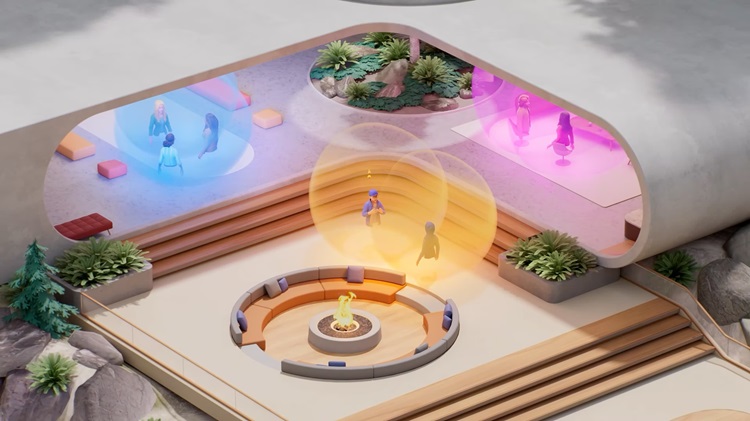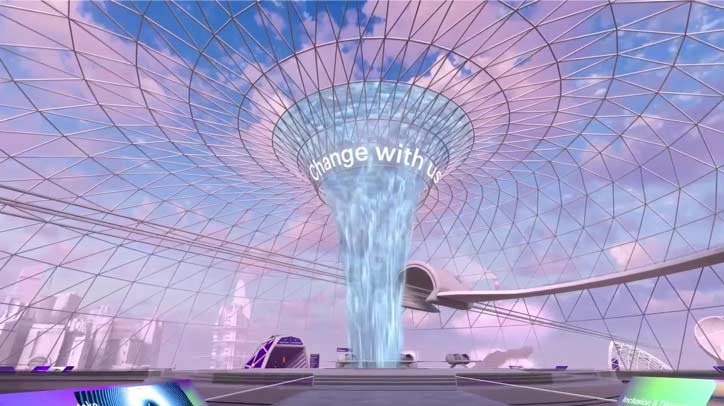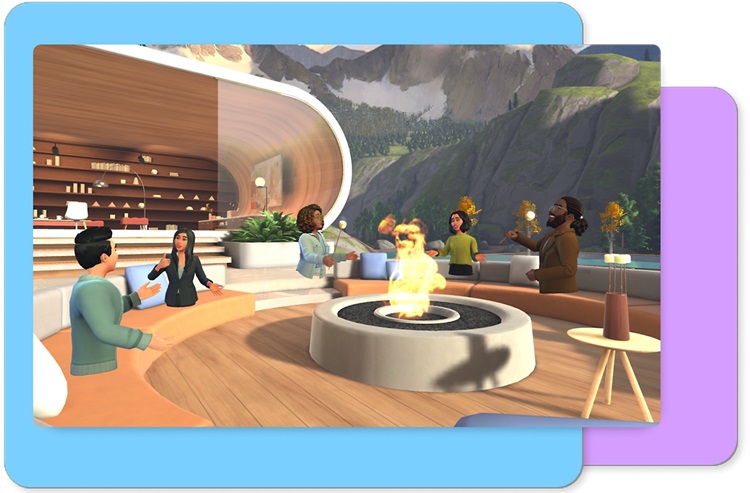In General XR News
January 27, 2024 – Microsoft has this week announced the integration of its Microsoft Mesh platform into Teams, enhancing virtual collaboration within the company’s business communication and messaging app, which is used by hundreds of millions of people.
Mesh in Teams introduces 3D immersive spaces for various purposes such as team socials, brainstorming, and round-table discussions. Users can create avatars for representation and participate in productive discussions with features like spatial audio, mirroring real-world interactions, according to Microsoft.
With the integration, users will still be able to use the same Teams features they are already familiar with, only now they will be able to do so from within a 3D space. This includes accessing shared content for collaboration, communicating with Teams chat, and using live reactions to express themselves. To initiate Mesh in Teams, users simply select the “immersive space (3D)” option in the View menu during a Teams meeting on PC.

Custom Virtual Experiences with Microsoft Mesh
Organizations can now host larger events with custom, immersive experiences through Microsoft Mesh. The platform’s no-code editor allows for the customization of ready-made spaces with elements like organizational logos, videos, and presentation content. Furthermore, with the Mesh toolkit users can harness the power of Unity to create their own custom interactive experiences.
Real-World Applications of Mesh
Microsoft noted that several leading organizations such as Takeda, Accenture, bp, and Mercy Ships have already been utilizing Mesh to build their own immersive spaces for onboarding, training, hosting large events, and running simulations:
Takeda‘s journey with Mesh began when the company sought a cost-effective way to help its geo-diverse workforce connect and further their common cultural understanding. The company built the ‘Hirameki Garden,’ a virtual space representing Takeda’s values and serving as a venue for large events. The initiative reflects Takeda’s commitment to fostering corporate culture and innovation.
“Microsoft Mesh empowers us to create custom virtual experiences that perfectly capture the spaces that represent our operating model, corporate philosophy, and values,” said Leo Barella, Takeda’s Chief Technology Officer. “When it comes to the potential use cases and benefits, we’re only really scratching the tip of the iceberg.”
Accenture’s onboarding program at ‘One Accenture Park,’ a virtual campus created in Mesh, has successfully integrated over 300,000 new hires. Each new-hire cohort is invited to ride a virtual monorail to different educational exhibits, expert talks in auditoriums, and events in gathering spaces to meet their colleagues and learn about key skills to be successful in their new roles.

Bp, a global energy company, collaborated with Microsoft to develop ‘Highly Immersive Visualization Environments’ (HIVEs) using Mesh. These digital solutions provide a collaborative environment to connect bp’s global teams more effectively and safely from anywhere in the world via a lower cost and lower carbon digital solution. Plus, experts will soon be able to come together virtually in HIVEs to monitor wind turbines in a remote location or troubleshoot equipment repairs using digital twins without ever leaving the office, according to the company.
Roger Rohatgi, Vice President and Global Head of Design for bp, stated: “By partnering with Microsoft Mesh, we are able to explore how to use advanced technology for faster, more informed, and safer decision making as we pursue our ambition to become an integrated energy company.”
Mercy Ships is an international charity that utilizes hospital ships to provide free surgical care and education to in-need communities in Africa. With the support of Dell Technologies and Link To VR, Mercy Ships built the ‘Global Mercy,’ a digital replica of one of their hospital ships, in Microsoft Mesh to train its diverse volunteer crew more efficiently. The Global Mercy provides immersive training and orientation experiences, reducing travel costs and enhancing operational effectiveness.
Dave Shwadlenak, Vice President of Information Services at Mercy Ships, noted that the organization is “excited by the prospect of using the Global Mercy digital twin in Mesh. It allows our volunteers, who travel to our vessels from around the world, to experience our ships virtually before they physically arrive, which enhances their onboarding experience.”

Microsoft noted that these are just a few examples of its customers currently transforming work with Microsoft Mesh, which is generally available now for businesses and organizations. Business plans are required to access Mesh features in Teams, however pricing for this starts at USD $4.00 per month with a Microsoft Teams Essentials plan.
To learn more about Microsoft Mesh in Teams, click here.
Image / video credit: Microsoft / YouTube
About the author
Sam is the Founder and Managing Editor of Auganix. With a background in research and report writing, he has been covering XR industry news for the past seven years.
